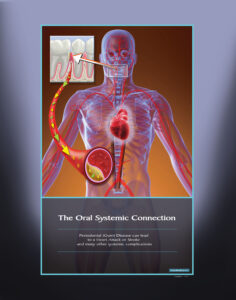 It has long been suspected that gum disease has a negative influencing association with cardiovascular and heart disease. As recent research emerges , the association seems to becoming stronger and more suspect. There are two pathways postulated by which gum disease may affect the heart and the entire cardiovascular system.
It has long been suspected that gum disease has a negative influencing association with cardiovascular and heart disease. As recent research emerges , the association seems to becoming stronger and more suspect. There are two pathways postulated by which gum disease may affect the heart and the entire cardiovascular system.
One pathway seems logical. Oral bacteria enter the bloodstream directly through fragile and inflamed capillaries in gum tissue (gingiva) affected by periodontal disease. As pathogenic bacterial populations traverse the oral circulatory barrier and travel throughout the body, they may attach to natural or prosthetic heart valves. This could result in bacterial endocarditis, which is serious and potentially life threatening. Pre-operatively and post-operatively periodontal treatment and maintenance of excellent oral hygiene can minimize the possibility of infection.
The second pathway whereby oral bacteria may affect the cardiovascular system could occur when the circulating bacteria contributes to an inflammatory event. This acute inflammation, if not stopped, often leads to chronic inflammation. If the inflammatory events are not resolved through healing, they may contribute to the overall immune system burden of the entire body. When the body is subject to chronic inflammation a cascade of immunological events could occur. This could produce a series of proteins, inflammatory markers and immune cells which damage the inner walls of blood vessels. If the vessels are damaged, atheromas or plaque laden areas form on the inner walls of the blood vessels. This decreases the size of the vessel opening, which in turn increases blood pressure and causes hypertension. The occluded vessels may go through a series of rupture/repair sequences, resulting in roughened surfaces of the vessels. These are ripe for the attachment and formation of platelet buildup. These newly formed platelet clumps are fragile. If they break off, they could occlude more narrow vessels downstream, causing blockage of blood flow to vital organs. If this series of events occur in the heart it is called a heart attack. If it occurs in the brain it is referred to as a stroke. Both conditions are major sources of death due to cardiovascular disease. Gum disease (periodontal disease) patients are statistically 2-3 times more likely to have a heart attack or stroke than patients with healthy gum tissue.
Patients who are particularly at risk for complications arising from untreated gum disease are those who are immune suppressed, have stents or have valvular pathology (congenital or acquired heart disease).
